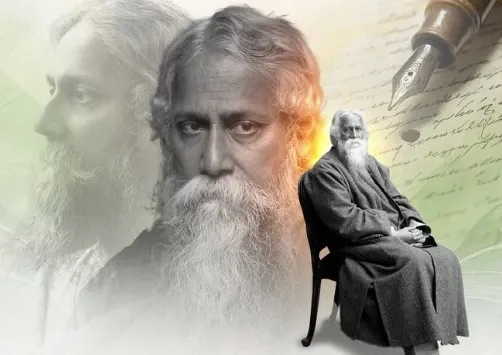How Did One of the Greatest Thought Leaders Inspire Generations? Congress Pays Tribute to Tagore on His Death Anniversary

Synopsis
Key Takeaways
- Tagore's legacy continues to influence literature and arts in India.
- He was the first non-European Nobel laureate in Literature.
- Tagore's works emphasize themes of humanism and cultural unity.
- He founded Visva-Bharati University to promote global learning.
- His music genre, Rabindra Sangeet, remains popular and influential.
New Delhi, Aug 7 (NationPress) The Congress party on Thursday commemorated the 84th death anniversary of Nobel Laureate Rabindranath Tagore, honoring the iconic poet, author, and philosopher for his enduring influence on India’s cultural and intellectual landscape.
Congress President Mallikarjun Kharge expressed a poignant tribute on social media platform ‘X’, stating: “Nothing is worse than one section of the populace enslaving the opinions of another through force and against their will…”
“Deepest respects to one of the greatest thought leaders the world has ever seen — Gurudev Rabindranath Tagore. A Nobel Laureate, social reformer, poet, philosopher, and humanist who penned India’s national anthem. His progressive views and contributions to various arts continue to inspire millions.”
Karnataka Deputy Chief Minister D.K. Shivakumar also honored Tagore, mentioning, “Paying tribute to Gurudev Rabindranath Tagore on his death anniversary. As a Nobel Laureate and philosopher, he awakened India’s cultural and intellectual spirit through his poetry and humanism. Let us carry forward his vision of a free, enlightened, and compassionate India.”
Congress MP D.K. Suresh reflected on Tagore’s role as a nation builder.
“Gurudev Rabindranath Tagore was a Nobel Laureate, poet, philosopher, and nation builder whose words shaped the soul of modern India. His contributions to literature, music, and thought continue to resonate across generations. On his death anniversary, we honor the poet whose ideas still shape our thoughts and dreams,” he said.
Rabindranath Tagore, born on May 7, 1861, passed away on August 7, 1941, at the age of 80 due to complications from uraemia and a blocked urinary bladder. Fondly remembered as the Bard of Bengal, he remains a towering figure in Indian literature, music, and philosophy.
In 1913, Tagore became the first non-European to be awarded the Nobel Prize in Literature for his collection 'Gitanjali', which introduced Indian spiritual and poetic thought to the Western world. He is one of the few artists in history to have composed the national anthems of two nations — India’s 'Jana Gana Mana' and Bangladesh’s 'Amar Shonar Bangla'.
His literary and artistic legacy includes over 2,000 songs, eight novels, 84 short stories, countless essays, plays, and poems. His work explored themes of freedom, identity, humanity, and cultural unity. He also pioneered a unique genre of music known as Rabindra Sangeet.
Tagore renounced his Knighthood, awarded by the British Crown in 1915, in protest against the 1919 Jallianwala Bagh massacre — an act that reinforced his standing as a moral beacon of the freedom movement.
He spent considerable time in what is now Bangladesh, composing many of his celebrated works in towns like Shilaidaha, Shahzadpur, and Patishar. In 1921, he founded Visva-Bharati University at Santiniketan, envisioned as a center for global learning rooted in Indian tradition.









